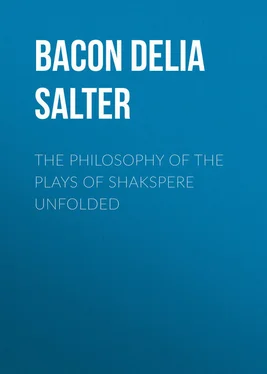Delia Bacon - The Philosophy of the Plays of Shakspere Unfolded
Здесь есть возможность читать онлайн «Delia Bacon - The Philosophy of the Plays of Shakspere Unfolded» — ознакомительный отрывок электронной книги совершенно бесплатно, а после прочтения отрывка купить полную версию. В некоторых случаях можно слушать аудио, скачать через торрент в формате fb2 и присутствует краткое содержание. Жанр: literature_19, foreign_antique, foreign_prose, на английском языке. Описание произведения, (предисловие) а так же отзывы посетителей доступны на портале библиотеки ЛибКат.
- Название:The Philosophy of the Plays of Shakspere Unfolded
- Автор:
- Жанр:
- Год:неизвестен
- ISBN:нет данных
- Рейтинг книги:3 / 5. Голосов: 1
-
Избранное:Добавить в избранное
- Отзывы:
-
Ваша оценка:
- 60
- 1
- 2
- 3
- 4
- 5
The Philosophy of the Plays of Shakspere Unfolded: краткое содержание, описание и аннотация
Предлагаем к чтению аннотацию, описание, краткое содержание или предисловие (зависит от того, что написал сам автор книги «The Philosophy of the Plays of Shakspere Unfolded»). Если вы не нашли необходимую информацию о книге — напишите в комментариях, мы постараемся отыскать её.
The Philosophy of the Plays of Shakspere Unfolded — читать онлайн ознакомительный отрывок
Ниже представлен текст книги, разбитый по страницам. Система сохранения места последней прочитанной страницы, позволяет с удобством читать онлайн бесплатно книгу «The Philosophy of the Plays of Shakspere Unfolded», без необходимости каждый раз заново искать на чём Вы остановились. Поставьте закладку, и сможете в любой момент перейти на страницу, на которой закончили чтение.
Интервал:
Закладка:
Here is an author who does contrive to pursue his philosophical points, however, dagger or no dagger, wherever they take him. By putting himself into the trick of singularity, and affecting to be a mere compound of eccentricities and oddities, neither knowing nor caring what it is that he is writing about, and dashing at haphazard into anything as the fit takes him, – 'Let us e'en fly at anything,' says Hamlet, – by assuming, in short, the disguise of the elder Brutus; and, on account of a similar necessity, there is no saying what he cannot be allowed to utter with impunity. Under such a cover it is, that he inserts the passages already quoted, which have lain to this hour without attracting the attention of critics, unpractised happily, and unlearned also, in the subtleties which tyrannies – such tyrannies – at least generate; and under this cover it is, that he can venture now on those astounding political disquisitions, which he connects with the complaint of the restrictions and embarrassments which the presence of a man of prodigious fortune at the table occasions, when an argument, trivial or otherwise, happens to be going on there. Under this cover, he can venture to bring in here, in this very connection, and to the very table, even of this man of prodigious fortune, pages of the freest political discussion, containing already the finest analysis of the existing political 'situation,' so full of dark and lurid portent, to the eye of the scientific statesman, to whom, even then, already under the most intolerable restrictions of despotism, of the two extremes of social evil, that which appeared to be the most terrible, and the most to be guarded against, in the inevitable political changes then at hand, was – not the consolidation but the dissolution of the state.
For already the horizon of that political oversight included, not the eventualities of the English Revolutions only, but the darker contingencies of those later political and social convulsions, from whose soundless whirlpools, men spring with joy to the hardest sharpest ledge of tyranny; or hail with joy and national thanksgiving the straw that offers to land them on it. Already the scientific statesman of the Elizabethan age could say, casting an eye over Christendom as it stood then, 'That which most threatens us is, not an alteration in the entire and solid mass, but its dissipation and divulsion .'
It is after pages of the freest philosophical discussion, that he arrives at this conclusion – discussion, in which the historical elements and powers are for the first time scientifically recognized and treated throughout with the hand of the new master. For this is a philosopher, who is able to receive into his philosophy the fact, that out of the most depraved and vicious social materials, by the inevitable operation of the universal natural laws, there will, perhaps, result a social adhesion and predominance of powers – a social 'whole,' more capable of maintaining itself than any that Plato or Aristotle, from the heights of their abstractions, could have invented for them. He ridicules, indeed, those ideal politics of antiquity as totally unfit for practical realisation, and admits that though the question as to that which is absolutely the best form of government might be of some value in a new world , the basis of all alterations in existing governments should be the fact, that we take a world already formed to certain customs, and do not beget it, as Pyrrha or Cadmus did theirs, and by what means soever we may have the privilege to rebuild and reform it anew, we can hardly writhe it from its wonted bent, but we shall break all . For the subtlest principles of the philosophy of things are introduced into this discussion, and the boldest applications of the Shakspere muse are repeated in it.
'That is the way to lay all flat ,' cries the philosophic poet in the Roman play, opposing on the part of the Conservatist, the violence of an oppressed people, struggling for new forms of government, and bringing out fully, along with their claims, the anti-revolutionary side of the question. 'That which tempts me out on these journeys,' continues this foreign philosopher, speaking in his usual ambiguous terms of his rambling excursive habits and eccentricities of proceedings, glancing also, perhaps, at his outlandish tastes – 'that which tempts me out on these journeys, is unsuitableness to the present manners of OUR STATE. I could easily console myself with this corruption in reference to the public interest , but not to my own: I am in particular too much oppressed: – for, in my neighbourhood we are of late by the long libertinage of our civil wars grown old in so riotous a form of state , that in earnest 'tis a wonder how it can subsist . In fine, I see by our example, that the society of men is maintained and held together at what price soever; in what condition soever they are placed they will close and stick together [see the doctrine of things and their original powers in the "Novum Organum"] — moving and heaping up themselves, as uneven bodies, that shuffled together without order, find of themselves means to unite and settle . King Philip mustered up a rabble of the most wicked and incorrigible rascals he could pick out, and put them altogether in a city which he had built for that purpose, which bore their name; I believe that they, even from vices, erected a government among them, and a commodious and just society.'
'Nothing presses so hard upon a state as innovation'; and let the reader note here, how the principle which has predominated historically in the English Revolution, the principle which the fine Frankish, half Gallic genius, with all its fire and artistic faculty, could not strike instinctively or empirically, in its political experiments – it is well to note, how this distinctive element of the English Revolution – that revolution which is still in progress, with its remedial vitalities – already speaks beforehand, from the lips of this foreign Elizabethan Revolutionist. 'Nothing presses so hard upon a state as innovation; change only gives form to injustice and tyranny. WHEN ANY PIECE IS OUT OF ORDER IT MAY BE PROPPED, one may prevent and take care that the decay and corruption NATURAL TO ALL THINGS, do not carry us too far from our beginnings and principles ; but to undertake to found so great a mass anew, and to change the foundations of so vast a building, is for them to do who to make clean, efface , who would reform particular defects by a universal confusion, and cure diseases by death .' Surely, one may read in good Elizabethan English passages which savor somewhat of this policy. One would say that the principle was in fact identical, as, for instance, in this case. 'Sir Francis Bacon (who was always for moderate counsels), when one was speaking of such a reformation of the Church of England, as would in effect make it no church , said thus to him: – 'Sir, the subject we talk of is the eye of England, and if there be a speck or two in the eye, we endeavour to take them off; but he were a strange oculist who would pull out the eye.' [And here is another writer who seems to be taking, on this point and others, very much the same view of the constitution and vitality of states, about these times: —
He's a disease that must be cut away.
Oh, he's a limb that has but a disease;
Mortal to cut it off; to cure it, easy.]
But our Gascon philosopher goes on thus, with his Gascon inspirations: and these sportive notions, struck off at a heat, these careless intuitions, these fine new practical axioms of scientific politics, appear to be every whit as good as if they had been sifted through the scientific tables of the Novum Organum. They are, in fact, the identical truth which the last vintage of the Novum Organum yields on this point. 'The world is unapt for curing itself; it is so impatient of any thing that presses it , that it thinks of nothing but disengaging itself , at what price soever. We see, by a thousand examples, that it generally cures itself to its cost. The discharge of a present evil is no cure, if a general amendment of condition does not follow ; the surgeon's end is not only to cut away the dead flesh , – that is but the progress of his cure; – he has a care over and above, to fill up the wound with better and more natural flesh , and to restore the member to its due state . Whoever only proposes to himself to remove that which offends him , falls short; for good does not necessarily succeed evil; another evil may succeed, and a worse, as it happened in Caesar's killers , who brought the republic to such a pass, that they had reason to repent their meddling with it .' 'I fear there will a worse one come in his place,' says a fellow in Shakespear's crowd, at the first Caesar's funeral; and that his speech made the moral of the piece, we shall see in the course of this study.
Читать дальшеИнтервал:
Закладка:
Похожие книги на «The Philosophy of the Plays of Shakspere Unfolded»
Представляем Вашему вниманию похожие книги на «The Philosophy of the Plays of Shakspere Unfolded» списком для выбора. Мы отобрали схожую по названию и смыслу литературу в надежде предоставить читателям больше вариантов отыскать новые, интересные, ещё непрочитанные произведения.
Обсуждение, отзывы о книге «The Philosophy of the Plays of Shakspere Unfolded» и просто собственные мнения читателей. Оставьте ваши комментарии, напишите, что Вы думаете о произведении, его смысле или главных героях. Укажите что конкретно понравилось, а что нет, и почему Вы так считаете.












